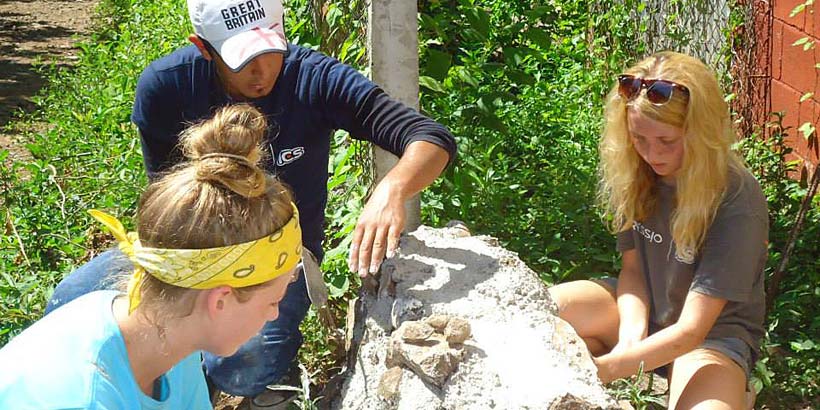There were many things I had anticipated when arriving in El Salvador with Progressio ICS in July; no more flushing toilets, power showers, air con or wifi. But one thing no one could have prepared me for was the sheer volume and variety of noises created by animals in the early hours of each morning, and how unnecessary my alarm clock would become.
When you look through the photos of Santa Marta’s scenery, you imagine a quiet and tranquil surrounding, but upon arrival you realise a truly quiet moment is much harder to find than originally thought. Even from the hills, we can still hear the community speaker playing ‘Bailando’ by Enrique Iglesias, which is quickly becoming our group’s favourite song to sing and dance to, having been able to learn all the words off by heart after hearing it daily.
At about 5am each morning the roosters that live outside our house begin, and by the time our 6am alarm goes off we’re already wide awake. This may be followed by clicking grasshoppers or barking dogs (chuchos), appearing to have a conversation from one side of Santa Marta to the other. At points, waking up in Santa Marta can feel like waking up in a zoo, where the only animal you can’t hear outside is a lion. We joke within the group about what the chickens could possibly be talking about, or whether they’re just reminding us they’re still there so we don’t forget about them. “I’m over here!” , shouts one chicken, “I’m a chicken!”, replies the other.
In the first few weeks here I’ve come across tarantulas, huge caterpillars, toads, cockroaches, grasshoppers and beautiful butterflies. There have been scorpions, and spiders the size of dinner plates that live in our shower. In the walk alone from our host home to Lety’s (where we eat during the day) it is expected that we’ll pass horses, donkeys and dogs apparently roaming the streets freely.
Even within our group, those of us with little Spanish or English communicate through dog barks and wolf howls, which only when writing this blog did I realise is all probably related in some way.

Not only are the animals loud, but the general atmosphere of the community is too. One culture shock I’ve particularly felt here is how different the rules about personal space are, and how open and lively the community is – it’s okay to play loud music that makes the neighbours roof shake, whereas in the UK this would prompt an uproar. Even fireworks (that echo across the whole town) will occasionally greet us in the early hours of the morning, including our first night in Santa Marta where we were woken by fireworks celebrating a religious event. Other mornings, the community speaker plays loud music while we brush our teeth and get ready for work. The local bus to Sensunte (a town about an hour away) sounds its horn upon arrival in the plaza at 6:30am, and again at 7:30am daily, just in case we weren’t already awake. This only covers a small fraction of the daily Santa Marta noises, and let’s not get started on how loud the rain is.
There are also many animals here that make no noise at all – a lizard that lives on our bedroom wall for example, and some very, very clever ants. This blog is not intended in a negative light, and is much more of an observation of what is considered ‘normal life’ in Santa Marta. Whilst I may not miss the noises that are becoming part of my daily routine, I think that home in the UK will suddenly seem much quieter when I return.
Written by ICS volunteer Albany Bradley
Por qué no necesitamos un despertador en Santa Marta
Hay muchas cosas que ya había previsto cuando llegué a El Salvador por primera vez con Progressio ICS en Julio: por ejemplo, que no habría ni inodoros, ni duchas, ni aire acondicionado ni internet. No obstante, había una cosa para la que no estaba preparada; el ruido. La cantidad, la frecuencia y la variedad del ruido que pueden producir los animales en las altas horas de la madrugada cada día me hizo saber rápidamente que un despertador no sería necesario.
Cuando hojeas fotos del paisaje de Santa Marta, te imaginas que sería un sitio muy tranquilo pero nada más llegar te das cuenta de que un momento pacífico y silencioso es mucho más difícil de encontrar de lo que habías pensado. Hasta en los montes se escuchan las canciones que ponen en el altavoz comunitario, en particular ‘Bailando‘ por Enrique Iglesias que ha llegado a ser nuestra canción favorita para cantar y bailar en el grupo de voluntarias/os y todas y todos hemos podido aprender la letra entera por escucharla diariamente.
Cada día a las 5 de la madrugada, los gallos que viven en el jardín de nuestra casa, empiezan a cantar, y antes de que suene nuestro despertador a las 6 ya estamos todos despiertos. Después, los grillos se ponen a cantar y los perros (o chuchos como se dice aquí) empiezan a ladrar como si estuvieran manteniendo una conversación desde un lado de la comunidad a otro. A veces, despertarse en Santa Marta es parecido a despertarse en un zoológico, y el único animal que falta en nuestro jardín haciendo ruido es un león. Nos divertimos pensando en de lo que están hablando las gallinas entre ellas o si solamente nos están hablando para que no las olvidemos. “¡Aquí estoy!” grita una “¡soy una gallina!” contesta la otra.
Dentro de las pocas semanitas que llevo aquí he visto tarántulas, orugas enormes, sapos, cucarachas, saltamontes y mariposas muy bonitas. Ha habido escorpiones y arañas con el tamaño de un plato viviendo en nuestra ducha. En el pequeño camino que hacemos todos los días desde nuestra casa a la casa de Lety (donde comemos) es normal que veamos caballos, burros y perros que andan solos por las calles.
En el grupo de voluntarias/os, nos enfrentamos al problema de la comunicación, y para aquellos que hablan poco inglés o español hasta a nosotros nos hace falta comunicarnos ladrando como perros o lobos. Solamente cuando me puse a escribir este blog me di cuenta de que esto estaba relacionado.
No solamente son los animales que hacen mucho ruido, sino también, la comunidad en general es muy ruidosa. Dos diferencias entre las culturas que me han asombrado mucho fueron las costumbres distintas con respeto al espacio personal y que aquí la gente pone música tan fuerte que hace temblar la casa de sus vecinos, esto causaría mucho conflicto en el Reino Unido. Hasta hay fuegos artificiales que se escuchan en toda la comunidad, y de vez en cuando nos asustan en las altas horas de la madrugada, incluso en nuestra primera noche en Santa Marta cuando nos despertaron algunos cohetes de un evento religioso. A veces, en la mañana el altavoz de la comunidad pone música fuerte mientras cepillamos los dientes y nos preparamos para ir al trabajo. El autobús para Sensunte (un pueblo a más o menos una hora) pita cada día cuando llega a la plaza a las 6:30 y otra vez a las 7:30, es nuestro último despertador, aunque sea altamente improbable que todavía no estuviéramos dormidos. Estos ejemplos son muy pocos de los ruidos diarios que se escuchan en Santa Marta, y todavía no he mencionado el ruido increíble que hace la lluvia.
Hay muchos animales aquí que no hacen ningún ruido, hay un lagarto que vive en la pared de nuestro cuarto, y algunas hormigas muy listas. Este blog no es un crítico negativo, sino es una observación de cómo se considera la ‘vida normal’ en Santa Marta. Aunque no vaya a extrañar estos ruidos, ahora forman parte de mi vida diaria. Creo que cuando regrese al Reino Unido, todo me va a aparecer muy silencioso.
Escrito por la voluntaria de ICS Albany Bradley y traducido por Amanda Cole



